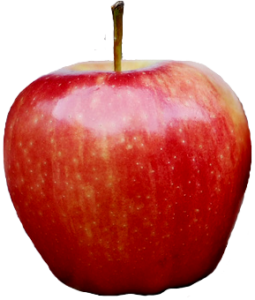 New research once again confirms that raw fruits and vegetables result in a person ingesting lots of microbes. Millions of bacteria. Which is considered beneficial for our gut microbiome! What's interesting in the latest study looking at bacteria in both conventionally and organically grown apples is that organic apples are a better source of bacteria - that their bacteria are more diverse, distinct, and balanced (when compared to conventionally grown apples).
New research once again confirms that raw fruits and vegetables result in a person ingesting lots of microbes. Millions of bacteria. Which is considered beneficial for our gut microbiome! What's interesting in the latest study looking at bacteria in both conventionally and organically grown apples is that organic apples are a better source of bacteria - that their bacteria are more diverse, distinct, and balanced (when compared to conventionally grown apples).
The Austrian researchers (Wassermann et al) wrote in the Frontiers In Microbiology: "Our results suggest that we consume about 100 million bacterial cells with one apple. Although this amount was the same, the bacterial composition was significantly different in conventionally and organically produced apples."
Interestingly, there were a lot of beneficial Lactobacillus species in the organic apples, but not conventionally grown ones. The researchers thought that the diverse microbiome of organic apples probably limits or hampers harmful microbes (human pathogens). The researchers also wrote: "The described microbial patterns in organic apples resemble the impact of apple polyphenols on human health, which have not only been shown to alleviate allergic symptoms (Zuercher et al., 2010), but also to promote growth of Lactobacillus and Bifidobacterium in the human gut and to reduce abundance of food-borne pathogens."
Another bonus of eating organic apples is that it means avoiding pesticides that are routinely sprayed on conventional fruit. So eat away! Microbes, fiber, and nutrients all in one small fruit!
Fun fact: The researchers write that apples are the most consumed fruit world-wide. Excerpts from Science Daily: An apple carries about 100 million bacteria -- good luck washing them off
To the heroes among you who eat the whole apple: besides extra fiber, flavonoids and flavor, you're also quaffing 10 times as many bacteria per fruit as your core-discarding counterparts. Is this a good thing? Probably. But it might depend on how your apples were grown.
Published in Frontiers in Microbiology, a new study shows that organic apples harbor a more diverse and balanced bacterial community -- which could make them healthier and tastier than conventional apples, as well as better for the environment.
You are what you eat. Nowhere more so than your bowel. "The bacteria, fungi and viruses in our food transiently colonize our gut," says study senior author Professor Gabriele Berg, of Graz University of Technology, Austria. "Cooking kills most of these, so raw fruit and vegetables are particularly important sources of gut microbes."
To help us choose our colonic colonists wisely, Berg's group analyzed the microbiome of one of the world's favorite fruits: the apple. ... The researchers compared the bacteria in conventional store-bought apples with those in visually matched fresh organic ones. Stem, peel, flesh, seeds and calyx -- the straggly bit at the bottom where the flower used to be -- were analyzed separately.
Microbial diversity suggests organic apple advantage. Overall, the organic and conventional apples were occupied by similar numbers of bacteria. "Putting together the averages for each apple component, we estimate a typical 240 g apple contains roughly 100 million bacteria," reports Berg.
The majority of the bacteria are in the seeds, with the flesh accounting for most of the remainder. So, if you discard the core -- for shame! -- your intake falls to nearer 10 million. The question is: are these bacteria good for you?
When it comes to gut health, variety is the spice of life -- and in this regard, organic apples seem to have the edge. "Freshly harvested, organically managed apples harbor a significantly more diverse, more even and distinct bacterial community, compared to conventional ones," explains Berg. "This variety and balance would be expected to limit overgrowth of any one species, and previous studies have reported a negative correlation between human pathogen abundance and microbiome diversity of fresh produce."
Specific groups of bacteria known for health-affecting potential also weighed in favor of organic apples. "Escherichia-Shigella -- a group of bacteria that includes known pathogens -- was found in most of the conventional apple samples, but none from organic apples. For beneficial Lactobacilli -- of probiotic fame -- the reverse was true."
And there may even be vindication for those who can "taste the difference" in organic produce. "Methylobacterium, known to enhance the biosynthesis of strawberry flavor compounds, was significantly more abundant in organic apples; here especially on peel and flesh samples, which in general had a more diverse microbiota than seeds, stem or calyx."
The results mirror findings on fungal communities in apples. "Our results agree remarkably with a recent study on the apple fruit-associated fungal community, which revealed specificity of fungal varieties to different tissues and management practices," comments Birgit Wasserman, Berg protégé and lead author of the study.
Together the studies show that across both bacteria and fungi, the apple microbiome is more diverse in organically grown fruits. Since another study has shown that the apple fungal community is also variety-specific, the bacterial analyses too should be repeated in other cultivars.
